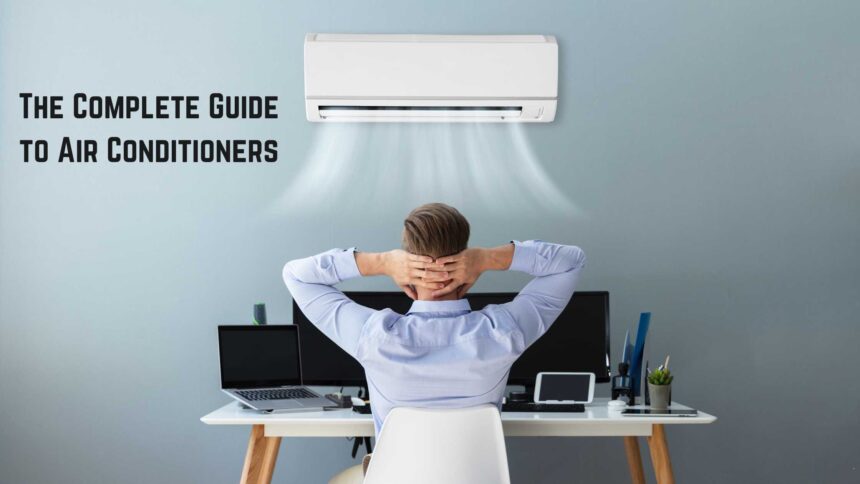The Complete Guide to Air Conditioners, Explore essential information about air conditioning systems, including buying tips, maintenance advice.
What is Air Conditioning?
Air conditioning (A/C) is more than just a button you press for a cool breeze. It’s a complex yet ubiquitous technology that revolutionized how we live and work in hot climates. But how exactly does it work, and what are the different options available? This comprehensive guide dives deep into the world of air conditioners, empowering you to make informed decisions for your home comfort needs.
How Does It Work?

At its core, air conditioning removes heat from an enclosed space to create a cooler and more comfortable environment.
- Evaporation: Warm indoor air passes over a cold evaporator coil filled with refrigerant. The refrigerant takes in heat from the air, which makes it evaporate (turn into gas).
- Compression: The refrigerant gas is compressed by a pump, which significantly increases its temperature.
- Condensation: The hot, compressed gas travels to the outdoor condenser coil. Here, the refrigerant releases its heat to the outside air and condenses back into a liquid.
- Expansion: The cooled liquid refrigerant then flows back to the evaporator coil, ready to absorb more heat and repeat the cycle.
And A fan helps circulate the cool air throughout the room, while another fan expels the hot air from the condenser unit outside.
Types of Air Conditioners
There’s no one-size-fits-all solution when it comes to air conditioners. Here you can see the most common types to consider:
- Central Air Conditioning Systems: These whole-house systems cool your entire home using a network of ducts. They offer efficient cooling but require professional installation.
- Window Air Conditioners: These self-contained units are ideal for spot cooling in single rooms. They’re relatively inexpensive but less powerful than central systems.
- Portable Air Conditioners: Similar to window units, these offer portable cooling solutions but are typically less powerful and noisier.
- Ductless Mini-Splits: These split systems consist of an outdoor condenser unit and one or more indoor air handlers. They provide efficient cooling for specific zones without ductwork.
Advantages and Disadvantages of Air Conditioners
Advantages:
- Improved Comfort: Air conditioners create a cool and refreshing indoor environment, especially during hot and humid summers.
- Better Air Quality: Some AC units have air filtration systems that remove dust, pollen, and other allergens, improving indoor air quality.
- Humidity Control: Air conditioners can help regulate humidity levels, preventing mould growth and creating a more comfortable feel.
Disadvantages:
- Energy Consumption: Air conditioners consume more power than any electrical appliance in the household, which leads to higher electricity bills.
- Installation Costs: Central air conditioning systems require professional installation, adding to the initial cost.
- Maintenance Needs: Regular cleaning and maintenance are crucial for optimal performance and lifespan.
Popular AC Brands with Cost and Reviews

Daikin
- Cost: Daikin AC units are generally on the higher end of the price spectrum, often ranging from $1,000 to $4,000 depending on the model and capacity.
- Reviews: Known for their energy efficiency and quiet operation, Daikin ACs receive positive reviews for reliability and performance.
Mitsubishi Electric
- Cost: Mitsubishi Electric ACs typically range from $1,500 to $3,500. Ductless models can be more expensive due to installation costs.
- Reviews: Highly regarded for their advanced technology and durability, Mitsubishi Electric ACs are favoured for their quietness and efficiency.
LG
- Cost: LG offers a wide range of AC units from $300 for small window units to $3,000 for larger ductless or central systems.
- Reviews: LG ACs are appreciated for their affordability, reliability, and user-friendly features. They are often praised for their cooling efficiency.
Carrier
- Cost: Carrier ACs typically range from $1,500 to $3,500, with premium models potentially costing more.
- Reviews: Carrier is well-regarded for its long history and reputation for quality. Their ACs are known for effective cooling and durability.
Lennox
- Cost: Lennox AC units generally range from $1,500 to $3,500, depending on the model and installation requirements.
- Reviews: Lennox ACs receive positive feedback for their energy efficiency, quiet operation, and reliability. They’re often recommended because they’re durable.
Fujitsu
- Cost: Fujitsu ACs typically range from $1,000 to $3,500, with ductless models being at the higher end of the range.
- Reviews: Fujitsu is praised for its innovative features and energy-saving technologies. Their ACs are known for their quiet operation and reliability.
Trane
- Cost: Trane ACs generally range from $1,500 to $3,500. Higher-end models or complex installations can exceed this range.
- Reviews: Trane ACs are respected for their robust build quality, efficiency, and longevity. They are often recommended for homeowners seeking durable cooling solutions.
York
- Cost: York ACs typically range from $1,000 to $3,000, depending on the model and capacity.
- Reviews: York ACs are appreciated for their affordability and reliability. They are known for providing good value for money in the mid-range segment.
Precautions While Using Air Conditioners

- Regular Maintenance:
Schedule regular cleaning of air filters and coils to ensure efficient operation and prevent malfunctions. - Set the Right Temperature:
Don’t blast your AC – a moderate temperature setting is more energy-efficient and comfortable. - Seal Air Leaks:
Leaky windows and doors can make your AC work harder. Seal any air leaks to maintain cool air indoors. - Upgrade to Energy-Efficient Models:
Consider investing in a high-efficiency AC unit, which can significantly reduce your energy consumption and long-term costs.pen_spark.
Conclusion:
Air conditioning has become an essential feature for many homes, offering a cool escape from hot and humid weather. The Complete Guide to Air Conditioners will help to understand the science behind how air conditioners work, the various types available, and the importance of maintenance, you can make informed decisions to maximize your comfort and keep your energy bills under control. Remember, a well-maintained AC unit not only ensures a cool and refreshing environment but also contributes to a healthier and more energy-efficient home. So, breathe easy and enjoy the comfort that air conditioning brings.
What is an OTG oven? and how does it work?
FAQ’s of Air Conditioners
- How often should I clean my air conditioner?
Air filter cleaning frequency depends on usage and environment. Generally, cleaning every 2-4 weeks during peak season is recommended. Consult your AC manual or manufacturer’s website for specific cleaning instructions for your unit. - Is it okay to leave my AC on all day?
While tempting, constantly running your AC isn’t ideal. It can increase energy consumption and wear on the unit. Using a programmable thermostat to regulate temperature can optimize comfort and efficiency. - Why is my AC blowing warm air?
There are several reasons. They are clogged air filters, low refrigerant levels, dirty coils, or thermostat malfunctions. - Should I open windows at night if I have AC?
No. Modern air conditioners are designed as closed systems. Opening windows negates the cooling effect and increases humidity, forcing your AC to work harder.





Thanks for this amazing information! Weldone